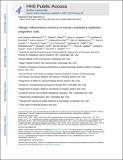Allergic inflammatory memory in human respiratory epithelial progenitor cells
Author(s)
Ordovas-Montanes, Jose Manuel; Dwyer, Daniel F.; Nyquist, Sarah Kate; Buchheit, Kathleen M.; Vukovic, Marko; Deb, Chaarushena; Wadsworth, Marc Havens; Hughes, Travis K.; Kazer, Samuel Weisgurt; Yoshimoto, Eri; Cahill, Katherine N.; Bhattacharyya, Neil; Katz, Howard R.; Berger Leighton, Bonnie; Laidlaw, Tanya M.; Boyce, Joshua A.; Barrett, Nora A.; Shalek, Alexander K; ... Show more Show less
DownloadAccepted version (2.785Mb)
Terms of use
Metadata
Show full item recordAbstract
Barrier tissue dysfunction is a fundamental feature of chronic human inflammatory diseases [superscript 1]. Specialized subsets of epithelial cells—including secretory and ciliated cells—differentiate from basal stem cells to collectively protect the upper airway [superscript 2–4]. Allergic inflammation can develop from persistent activation [superscript 5] of type 2 immunity [superscript 6] in the upper airway, resulting in chronic rhinosinusitis, which ranges in severity from rhinitis to severe nasal polyps [superscript 7]. Basal cell hyperplasia is a hallmark of severe disease [superscript 7–9], but it is not known how these progenitor cells [superscript 2,10,11] contribute to clinical presentation and barrier tissue dysfunction in humans. Here we profile primary human surgical chronic rhinosinusitis samples (18,036 cells, n = 12) that span the disease spectrum using Seq-Well for massively parallel single-cell RNA sequencing [superscript 12], report transcriptomes for human respiratory epithelial, immune and stromal cell types and subsets from a type 2 inflammatory disease, and map key mediators. By comparison with nasal scrapings (18,704 cells, n = 9), we define signatures of core, healthy, inflamed and polyp secretory cells. We reveal marked differences between the epithelial compartments of the non-polyp and polyp cellular ecosystems, identifying and validating a global reduction in cellular diversity of polyps characterized by basal cell hyperplasia, concomitant decreases in glandular cells, and phenotypic shifts in secretory cell antimicrobial expression. We detect an aberrant basal progenitor differentiation trajectory in polyps, and propose cell-intrinsic [superscript 13], epigenetic [superscript 14,15] and extrinsic factors [superscript 11,16,17] that lock polyp basal cells into this uncommitted state. Finally, we functionally demonstrate that ex vivo cultured basal cells retain intrinsic memory of IL-4/IL-13 exposure, and test the potential for clinical blockade of the IL-4 receptor α-subunit to modify basal and secretory cell states in vivo. Overall, we find that reduced epithelial diversity stemming from functional shifts in basal cells is a key characteristic of type 2 immune-mediated barrier tissue dysfunction. Our results demonstrate that epithelial stem cells may contribute to the persistence of human disease by serving as repositories for allergic memories. K
Date issued
2018-08-22Department
Massachusetts Institute of Technology. Institute for Medical Engineering & Science; Massachusetts Institute of Technology. Department of Chemistry; Ragon Institute of MGH, MIT and Harvard; Massachusetts Institute of Technology. Computational and Systems Biology Program; Massachusetts Institute of Technology. Computer Science and Artificial Intelligence Laboratory; Massachusetts Institute of Technology. Department of Mathematics; Harvard University--MIT Division of Health Sciences and Technology; Koch Institute for Integrative Cancer Research at MITJournal
Nature
Publisher
Springer Nature
Citation
Ordovas-Montanes, Jose et al. "Allergic inflammatory memory in human respiratory epithelial progenitor cells." Nature 560, 7720 (2018): 649–654 © 2018 Springer Nature
Version: Author's final manuscript
ISSN
0028-0836
1476-4687